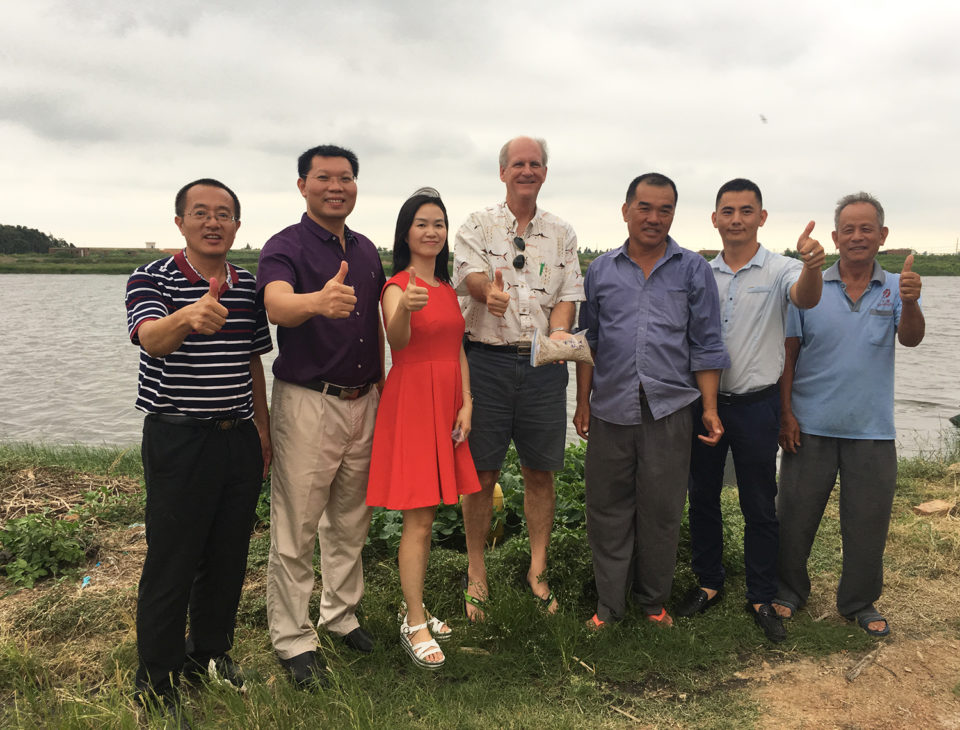Chinese company makes ‘huge strides’ in first-ever alternative ingredients contest

Guangdong Evergreen Feed Industry Co., Ltd. (Evergreen) was named the winner of the inaugural F3 Challenge, a global contest to drive innovation in the aquafeed sector and reduce the aquaculture industry’s reliance on marine ingredients like fishmeal and fish oil.
The Chinese feed company earned a prize of $201,000 and was congratulated by contest organizers during the Global Aquaculture Alliance’s GOAL conference in Dublin, Ireland, on Oct. 4.
“We congratulate Evergreen on winning the first F3 contest. I have closely followed the freshwater fish farming industry in China for more than 20 years and it is truly amazing how innovators like Evergreen have transformed farming systems that go back 2,000 years,” Kevin Fitzsimmons, professor at the University of Arizona and one of the contest’s expert judges.
Starting in 2015 with a seed prize of $100,000 and organized by the University of Arizona, the New England Aquarium and the organizers of the X-Prize, the F3 (fish free feed) Challenge quickly blew past its original funding goal. Via crowdsourcing, the prize doubled in just a few months and attracted some of the biggest names in the fish-feed manufacturing world.
Fitzsimmons said the changes in the feed sector, as led by Evergreen, are huge strides in sustainability and food safety that are increasing the quantity of seafood produced for domestic and international markets.
“Only new concepts, new technologies, new formulations and new products can help the aquaculture industry to meet the requirements of the market,” Evergreen executives Dr. Cheng Chengrong and Yuchi Chen said in an emailed response to the Advocate. The company started its research into “zero marine animal protein feed” more than five years ago. The fish-free feed it submitted to the contest – comprising vegetable protein from soybean meal, rapeseed meal and peanut meal – now represents up to 8 percent of its sales.
“Aquaculture is rapidly developing. Not only in China, also around the whole world, aquaculture will become stronger and stronger,” they added. “People will rely on aquaculture more and more. We have to seek out [fishmeal and fish oil] alternatives for sustainable development.”
More than 100,000 metric tons of fish-free feed were sold by contestants since the sales contest began in May 2016. F3 organizers say the amount of fish-free aquafeed sold during the contest was roughly equivalent to 100 million forage fish from the ocean. Contestants used feed ingredients from plants, insects, algae and bacteria as a base. F3 Challenge judges tested and verified that all contestant feeds were fish free.
Five contestant teams – from China, the United States, Austria, Myanmar, South Africa and Pakistan –advanced to the final sale reporting deadline last month. Guangdong Evergreen Feed Industry Co., Ltd was the winner at 66,515 metric tons of feed sold. According to the company, all of its sales are within China.
Only new concepts, new technologies, new formulations and new products can help the aquaculture industry to meet the requirements of the market.
“The large quantities of feed that were sold by Evergreen and the other contestants for several different species, demonstrates the desire of farmers to participate in opportunities to improve industry sustainability and utilize alternatives to fish meal in their production diets,” said Fitzsimmons. “The concerted efforts across the industry, including many who were not contestants, to develop and incorporate alternative ingredients, demonstrates how broad the need is to protect forage fish stocks for the future, while maintaining profitability and seafood quality.”
In second place with 31,600 metric tons is the team comprised of Myanmar-based Htoo Thit Co. and global animal nutrition company Biomin.
Now that you've finished reading the article ...
… we hope you’ll consider supporting our mission to document the evolution of the global aquaculture industry and share our vast network of contributors’ expansive knowledge every week.
By becoming a Global Seafood Alliance member, you’re ensuring that all of the pre-competitive work we do through member benefits, resources and events can continue. Individual membership costs just $50 a year. GSA individual and corporate members receive complimentary access to a series of GOAL virtual events beginning in April. Join now.
Not a GSA member? Join us.
Author
-

James Wright
Editorial Manager
Global Aquaculture Alliance
Portsmouth, NH, USA
Tagged With
Related Posts

Aquafeeds
F3 Prize: Putting money where fish’s mouths are
Interest is growing in a two-year-long competition aimed at driving innovation in the aquafeed sector. The F3 prize for a demonstrably fish-free feed comes with a cash reward, and possibly a glimpse at the future.

Aquafeeds
Why I chose to judge the F3 challenge
In an opinion piece for the Advocate, the director of ocean sustainability science at the New England Aquarium talks about the F3 Challenge and what the first X Prize for aquaculture could do for the industry: drive innovation.

Aquafeeds
Talent show: Aquafeed companies show off at F3
Aquafeed manufacturers and alternative feed ingredient suppliers from all over the world gathered in Silicon Valley for F3, the Fish Free Feed contest. In the hub of innovation, solutions to a global problem were on full display.

Aquafeeds
F3 takes on a new challenge – fish oil alternatives
Building off the success and excitement of the fish-free aquaculture feed cash-prize contest that concludes this fall, the F3 Challenge has set its sights on a new target: fish oil alternatives.

